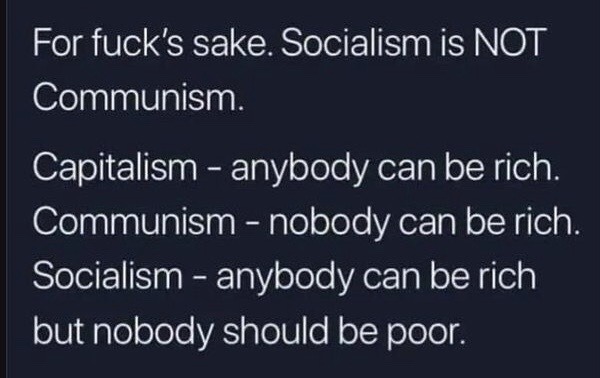For Fuck's Sake, Socialism Is Not “Nobody Should Be Poor”
Written in response to the following screenshotted post:

This is a general pop culture understanding of socialism, communism, and capitalism that is reflective of a radlib failure to understand what capitalism actually is (which then extends to misunderstandings of communism and other anti-capitalisms).
“[C]apital is not a thing; it is a social relationship between people that is mediated by things.”1 The nature of this social relationship is a hierarchical power structure where the capital-possessing class (the bourgeoisie) exploits the class dispossessed of capital (the proletariat). Capitalism is not merely the accumulation of material things; it is a system of social relations organized around denying access to material means of survival unless that access keeps the access-holders in power.
How do the dispossessed access material means of survival in a way that keeps the access-holding bourgeoisie in power? Through work, the exploitative social relationship that is necessary for capital and the capitalist system derived from it to exist. A proletarian must always go back to work in order to continue having access to material means of survival—and if they don't, can't, or can't find work, they must be materially supported through charitably donated or criminally stolen access to capital. A bourgeois must always have others working for them in order to continue controlling access to material means of survival—and under capitalism, if they can't find enough workers and lose that control, their only choice is to fall down to the proletarian class and adopt proletarian means of survival.
Analyzing capitalism as an idealist system of inequality in terms of rich versus poor—in terms of owning lots of material things versus owning few material things—doesn't sufficiently get at the depth of the problem. I am defining richness and poorness in terms of ownership for the sake of easing radlibs who've likely never read any communist theory into communist understandings of class in terms of owning capital. Again, capital is not an accumulated mass of material things—it is not even material things in general—but exploitative control over access to material means of survival. Insinuating that under communism, “nobody can be rich” is a negative fundamentally denies what richness actually is under capitalism—an embodiment of successful exploitative control over access to material means of survival. There is no unexploitative method of becoming rich, of gaining ownership over material wealth—and in fact I've heard someone argue that under communism, we should expect material standards of living to decrease, because the “higher” standards of living those of us are used to in the imperial core only exist as a result of us exploiting the periphery.
The framing of socialism as a middle ground between capitalism and communism is a bit more closer in alignment to Marxist-Leninist framings of socialism as a “'first,' or lower, phase of communist society.”2 But the difference here is that instead of distinguishing socialism as something positive opposed to the supposed negative of communism, Marxist-Leninists understand socialism as a transitional system towards communism developed out of capitalism, where capital, the means of reproducing labor power as a an exchangeable product, is “no longer the private property of individuals” but “belong[s] to the whole of society,” and every worker “receives from society as much as he has given to it.”3
This socialist goal of bringing the exchange of labor power closer in alignment with workers' needs has some affinity with the more revolutionary social order envisioned by communism, embodied by the slogan “from each according to his ability, to each according to his needs.”4 In a communist social order, people “will voluntarily work according to their ability” because “their labor has become so productive”5—productive in this sense doesn't mean capitalistically reproducing labor power (the capacity for useful work) as an exchangeable product, but reproducing labor (the act of changing material things) as “life's prime want”—as something that produces material conditions that increase the “all-around development of the individual”6 and not its opposite (deliberate underdevelopment).
Understood as a transitional stage between capitalism and communism, socialism is not about equalizing the opportunity for everyone to own lots of material things without material exploitation, but a specific attempt at a system of resistance against capitalist work—a specific attempt to reproduce new material conditions under which labor can be exercised as an activity integrated with—not separated or alienated from—the rest of life. As Gilles Dauvé explains in Eclipse and Re-emergence of the Proletariat, this integration and freedom from alienation will not be achieved through compulsory labor, which is similar to the coerced labor for survival we have under capitalism, but through changes in the process and logic of things we produce and consume.
The radlib concern over inequality between rich and poor—which I have generously reframed as concern over inequality in ownership of material wealth—is a bourgeois owning-class-minded start to questioning the capitalist hierarchy. In order to start reaching radical and revolutionary anti-capitalist thresholds of questioning, radlibs have to start understanding that the issue isn't exclusion from ownership over access to material means of survival but exclusion from access—and that the answer to a system of exclusion from access is not for those excluded to seize ownership, not to collectivize, self-manage, or equalize ownership, but for ownership to be abolished altogether.
—parrhesia
1. Marx, Capital Vol. 1, Ch. 33
2. "First phase" comes from Marx's Critique of the Gotha Programme, the whole quote comes from Ch. 5 Sec. 4 of Lenin's The State and Revolution
3. Lenin, The State and Revolution Ch. 5 Sec. 3
4. And this slogan comes from Marx's Critique of the Gotha Programme, which this analysis and this analysis' quoted sections of Lenin's The State and Revolution are responding to.
5. Lenin, The State and Revolution Ch. 5 Sec. 4
6. Marx, Critique of the Gotha Programme